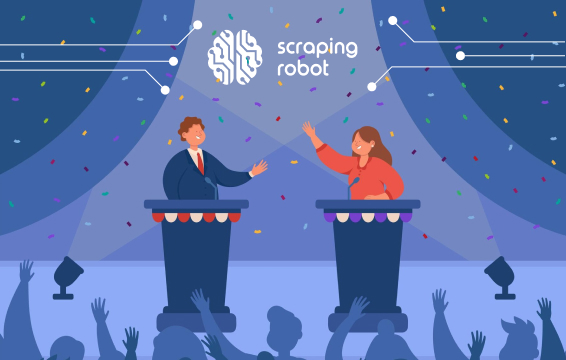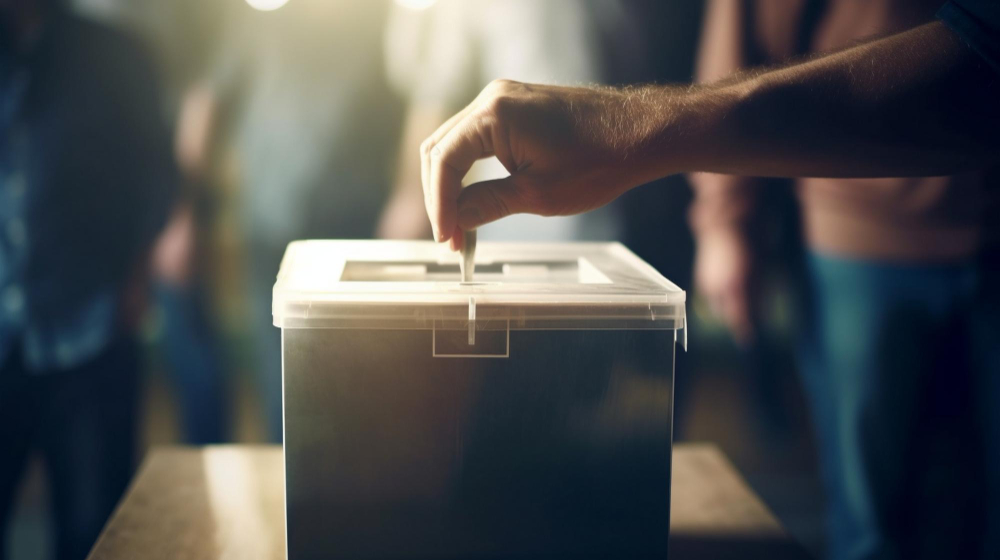Use Political Data And Web Scraping For A Winning Campaign

Watching the 2020 election results roll in, I couldn’t help but feel overwhelmed by all the different metrics being explained all at once. Scrolling through social media that week, it was clear my friends felt the same as I saw meme after meme about the insanely detailed nature of the results coverage. While it may be hard for the average person to grasp, big data changed elections forever and campaigns continue to gather more and more information each election cycle, from public voting records to analyzing voter attitudes on social media. This created massive change in the way campaigns are run and how they reach out to voters.
Unfortunately, the largest political data sets are mostly available to large campaigns with financial and political resources. As the Cambridge Analytica scandal revealed, there is lots of controversy surrounding the use of data by established political parties in online advertising. If you are a grassroots organizer or trying to run a local campaign, web scraping enables you to access political data and strengthen your chances of winning and making change. For business owners, understanding the political values of your target group/audience can help you with knowing what values to market. For example, younger people are worried about the environment and are more likely to support brands that are eco-friendly.
If you already know the basics of political campaign data, use the table of contents below to discover how to use data in your campaign.
Table of Contents
What Is Political Data Analytics?

Political data analytics is the process of collecting and understanding data about voters beliefs, voter demographics, district information, and election results. By analyzing political data, politicians and campaigns better understand what messages attract their party’s voters and the best ways to reach them. Usually, these data sets are bought by campaigns from partisan and nonpartisan vendors. Campaigns also hire data analysts to create data sets for target areas and gather social media analytics. While this wealth of information helps campaign strategies develop and track progress, there is rising criticism that this data helps parties cater to their own voters and stops them from reaching out to members of other parties.
Outside the world of political campaigning, business owners can use political data to understand the values and issues that their customers care about. This data provides valuable marketing information that can be used in messaging around brand values and inspire businesses to collaborate with charities on the forefront of these issues.
How Does Big Data Impact Political Campaigns?

Government agencies collect tons and tons of publicly available data. Whether the census or national causes of death, this information is valuable to those interested in public policy. For example, once you read the data and understand how often young people are dying from addiction, you create policy to help support those suffering from addiction receive proper treatment. With census information, you can understand changing demographics and use them to predict future political issues and work to solve them. Business can learn useful demographic information (income, education level, etc) about their target audiences that can be used in a pricing strategy or advertising message.
Big data forever changed the nature of campaigns. With the development of social media, many campaigns are now able to reach voters in a more direct and coordinated way. Again, there is debate within politics about whether or not data is changing politics for the better. Some argue that the focus on data causes parties to reach out less to voters they anticipate would not support them. However, data also opens campaigns up to discovering new groups of voters to reach. Especially for smaller campaigns with fewer resources, knowing exactly where to focus your energy can make all the difference. To learn more, read this interview with political scientist Eitan Hersh about big data’s impact on politics.
4 Ways Political Campaign Data Helps You Win

Understand voter beliefs
People constantly take to social media sites to share their political opinions, which means campaigns can gather tons of information from social media to gauge the attitudes of voters. For example, searching different trending topics on social media gives you an account of what people are constantly saying about a given political issue. By scraping the contents of these profiles and pages, you can discover other attributes on your ideal voters.
When political data helps you determine your target audience, it becomes easier to appeal to their values, opinions, and tastes. Young voters, whose power to decide elections is growing exponentially, are mostly online. I’m 23 and I get most of my news and political information from following various sources on social media instead of regularly checking websites themselves. By reaching young voters where they are, your campaign can gain lots of momentum. Read our previous blog about leveraging the power of social media data here. Sentiment analysis gives companies insight into how people feel about certain brands and products. This is useful in the political realm too because your voters beliefs about certain companies and brands impact their policy desires. Read more about sentiment analysis here.
Develop a data-driven campaign platform
While we often get caught up in political personalities, policy is what truly makes a difference in people’s daily lives. Once you have an understanding of social media and polling, it’s important that your campaign’s platform speaks to the issues voters care about and mobilize in favor of. By using data insights to create a coherent platform, voters will be more receptive to your goals and plan of action. As a campaign progresses, scraping is useful at every stage of the election cycle. If your campaign succeeds, then it is only the beginning of understanding voter sentiment. A more robust well of audience data will help you incorporate policy into your platform that addresses the needs of voters, ensuring you truly have a focused message worth spreading.
Reach people
Political data is useful for understanding voters and issues, but it’s essential for learning how to contact people. By using public voting records, you can find out valuable demographic information about registered voters (party affiliation, district, race, education, income level, etc). This makes it easier to know who to reach out to and what issues might appeal to them most. For example, someone who is highly educated with student loan debt might be more interested in proposals for erasing student debt than someone who never went to college. By narrowing your focus with the use of political data sets, you can win lots of people over while still appealing to them personally. These data sets also give you basic contact information that is extremely useful for reaching voters.
Analyze local elections
Unfortunately, national elections get more press than local elections. While this makes sense, it also creates challenges for grassroot organizers and local campaigns that are usually locked out of the political data sources that larger, national campaigns can afford. Thankfully, web scraping is an easy way to create data sets for locally-minded issues and elections. By scraping public data, political underdogs can find ways to compete for larger campaigns without needing the extravagant budgets. This article is a guide for local campaigns that want to begin to use data.
The Best Ways To Collect Political Data For Your Next Campaign

Custom scraping solutions
As mentioned above, political big data is often sold to statewide and national campaigns and fails to reflect needs at the local level. With Scraping Robot’s custom scraping solutions, our team helps you fulfill your data needs with custom scrapers that can be built to scrape at scale. While the existing modules are limited, custom scraping solutions scrape by the millions making this a perfect route for organizers trying to reach tons of voters. It also means you pay less per scrape than with the modules.
Political campaigns require so much intense work that having a Scraping Robot team create a custom solution frees you from having to do the costly work of managing proxies and hiring developers. With custom scraping modules, you can monitor social media for sentiment analysis, uncover valuable insights from public records, and understand competitors. If a custom scraping solution can lead your campaign to victory through a data-driven strategy, contact us to get started.
Conclusion

Political data is changing the way successful campaigns are managed by incorporating data-driven research into decision making. By utilizing tons of data that can better predict voter outcomes, campaigns can understand how and where to focus their attention. While data helps you reach current voters, it can also help your campaign discover new groups to approach. While much of this data is available for larger campaigns that can afford it, web scraping is an easy way for organizers and local campaigns to access similar information and create solid campaign plans. Not only will scraping help you grasp the issues voters find most important, but also help you reach them exactly where they are.
The information contained within this article, including information posted by official staff, guest-submitted material, message board postings, or other third-party material is presented solely for the purposes of education and furtherance of the knowledge of the reader. All trademarks used in this publication are hereby acknowledged as the property of their respective owners.
